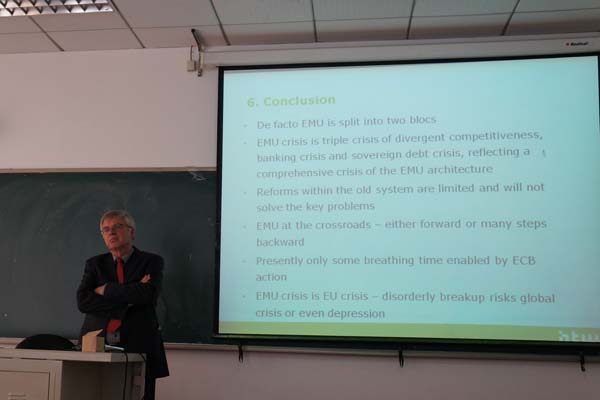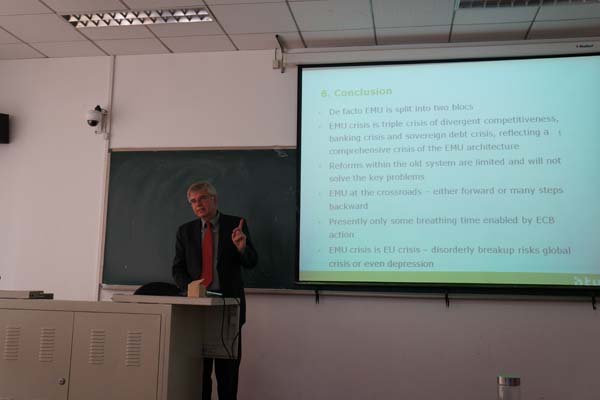Economist reveals uncertain future of Eurozone
- By Wu Jin
 0 Comment(s)
0 Comment(s) Print
Print E-mail China.org.cn, October 19, 2012
E-mail China.org.cn, October 19, 2012
Fundamental reforms seem inevitable for the Economic and Monetary Union (EMU) of the European Union (EU), now at a crossroads, in order to avoid disintegration and an economic breakdown, Jan Priewe, the German professor from HTW Berlin University of Applied Sciences, said on Oct. 16 when giving a lecture to a group of Chinese students and faculty staff from Beijing’s Central University of Finance and Economics.
In his one-and-half-an-hour analysis on the origins and consequences of the Eurozone crisis, he listed three possible scenarios — stagnation, disintegration of EMU and fundamental reforms towards EMU integration — that may occur after the current baffling financial turmoil, which was triggered by the sovereign debt crisis about three years ago.
|
|
|
Jan Priewe, the German professor from HTW Berlin University of Applied Sciences gives lecture on Eurozone crisis to a group of Chinese students and faculty staff from Beijing's Central University of Finance and Economics, Oct. 16, 2012. [China.org.cn] |
The stagnation will probably be engendered from the severe recession of the GIIPS (Greece, Italy, Ireland, Portugal, Spain) in the future if the austerity policies in pushing the abovementioned countries to cut their budgets continue to work.
According to Priewe, this scenario would be rather contagious with Greece's possible demand for a third rescue package and Spain’s inability to recapitalize its banks due to the strict conditions imposed by institutions such as the European Central Bank (ECB).
"[The effect] would be that of a chain of dominoes," Priewe said, "The contagion will [hence] spread from Italy to France, the biggest creditor to Italy in terms of sovereign bonds."
Disintegration is not an optimistic option either.
Despite its substantially high debt-to-GDP ratio, which reached to about 143 percent in 2010, Greece is very unlikely to be kicked out of the EMU, even it does request to leave voluntarily. According to the laws and customs of the EU, once a country becomes a member of its mechanism, it is very unlikely for it to get out.
"Somebody believes it is mainly a Greek crisis, so let’s kick Greece out of the EMU; not kick them out illegally, but by making conditions so uncomfortable they leave out of their own free will. On the surface, this seems like an easy option, but it is in fact very expensive," Priewe said.
 |
|
Jan Priewe, the German professor from HTW Berlin University gives lecture on Eurozone crisis to a group of Chinese students and faculty staff from Beijing's Central University of Finance and Economics, Oct. 16, 2012. [China.org.cn] |
According to Priewe, once Greece leaves the EMU, its creditors, such as Germany and France, will no longer get their money back. And the domino effect would prevail in Spain and Italy, which would in turn be devastating to the banks such as those in Germany. These banks have purchased immense bonds from those countries and would cause them to be recapitalized by the government.
"[Even though opposing the strong public opinion in Germany], Angela Merkel understand it is too risky [to kick Greece out]," said the professor.
Meanwhile, disintegration will probably trigger the second capital flight with deposits uncontrollably flowing to countries such as Germany and Switzerland and leading to immediate bankruptcies and insolvencies to the banking system, which in turn will put Greece under enormous stress.
What's more, consequences would be even more devastating with Germany exiting the Eurozone and leaving France, Spain and Italy to create a Latin Euro in drastic depreciation against Germany's subsequent appreciation.
According to Priewe, it would cause an even grimmer crisis after the financial meltdown signaled by the collapse of Lehman Brothers. And the subsequent huge impact of the global depression would not be easily alleviated by any fiscal stimulus.
For the aforementioned reason, the professor concluded that a moderately good alternative would be that of fundamental reforms towards EMU integration in order to mitigate austerity, plan strong pro-cyclical fiscal policies, unify the Euro treasuries and bonds, and enhance Germany’s leadership inside the mechanism.
"The EMU is now standing at a crossroads," said Priewe, elaborating that it would either be split into two blocs or maintain unity according to its reaction-of-choice to the abovementioned measures.
However, when standing before a class of Chinese faces, Priewe cannot inevitably avoid the topic of the Chinese economy.
When questioned what China should do to help relieve the financial crisis in the Eurozone, the professor said the country’s own revitalization amid the prevalent global economic depression would be key.
He mentioned the real estate bubbles, whose rupture particularly hit the economies of both Ireland and Portugal in full force, explaining that China’s government should make a conscientious effort to squeeze them out.
"We control [housing] rents in our country and we don’t follow the ideology that every man and woman should own house of their own," Priewe said.







Go to Forum >>0 Comment(s)